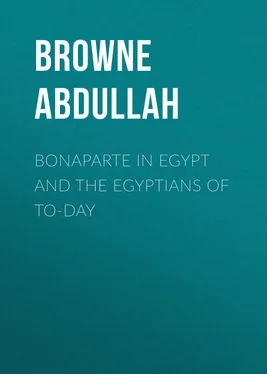Abdullah Browne - Bonaparte in Egypt and the Egyptians of To-day
Здесь есть возможность читать онлайн «Abdullah Browne - Bonaparte in Egypt and the Egyptians of To-day» — ознакомительный отрывок электронной книги совершенно бесплатно, а после прочтения отрывка купить полную версию. В некоторых случаях можно слушать аудио, скачать через торрент в формате fb2 и присутствует краткое содержание. Жанр: Историческая проза, foreign_antique, foreign_prose, foreign_language, на английском языке. Описание произведения, (предисловие) а так же отзывы посетителей доступны на портале библиотеки ЛибКат.
- Название:Bonaparte in Egypt and the Egyptians of To-day
- Автор:
- Жанр:
- Год:неизвестен
- ISBN:нет данных
- Рейтинг книги:4 / 5. Голосов: 1
-
Избранное:Добавить в избранное
- Отзывы:
-
Ваша оценка:
- 80
- 1
- 2
- 3
- 4
- 5
Bonaparte in Egypt and the Egyptians of To-day: краткое содержание, описание и аннотация
Предлагаем к чтению аннотацию, описание, краткое содержание или предисловие (зависит от того, что написал сам автор книги «Bonaparte in Egypt and the Egyptians of To-day»). Если вы не нашли необходимую информацию о книге — напишите в комментариях, мы постараемся отыскать её.
Bonaparte in Egypt and the Egyptians of To-day — читать онлайн ознакомительный отрывок
Ниже представлен текст книги, разбитый по страницам. Система сохранения места последней прочитанной страницы, позволяет с удобством читать онлайн бесплатно книгу «Bonaparte in Egypt and the Egyptians of To-day», без необходимости каждый раз заново искать на чём Вы остановились. Поставьте закладку, и сможете в любой момент перейти на страницу, на которой закончили чтение.
Интервал:
Закладка:
Orientals generally are capable of a high degree of education or training according to our standards: in India we have men who, in debate and authorship in our language, are entitled to rank with some of our own best men; but mentally even these are apart from us, and in this respect, as Kipling says, "East is East and West is West, and never the twain shall meet." Nor is it we only who cannot understand them, since they stumble as often and err as widely in their efforts to comprehend us, and even, as I think, more grossly and more hopelessly. None the less, it is, I believe, quite possible for a European to at least partly bridge the gulf and become familiar with Eastern thought and sentiment, but to do so he must pay a heavy price, for it is to be done only by one who will give not merely years of time, but years of self-abnegation, of self-suppression, of self-isolation to the task. Abandoning all that he has been he must seek to become that which he is not, and severing his life from all that has made it his, forego his tastes, stifle his prejudices, ignore his predilections, suppress his emotions, thwart his inclinations, and laughing when he would weep, weep when he would laugh. And with this slaying of his own individuality he must in all things strive to identify himself with those alien to him, ever seeking to see, hear, think, and act as they do. And he must do this not for a week, a month, or a year, but for many years. Not in one city, town or country, but in several, not merely mixing as best he may with the wealthy and the poor, the illiterate and the learned, but learning to be at home in the abodes of the prosperous and the haunts of the miserable, become equally so with the merchant in the bazaar and the wandering fakir in the desert. And through it all he must ever be other than his home life and training have made him. Ceaselessly on the alert to detect the nature, feelings, and impulses of others and to hide his own. And he must be and do all this day and night, in the loneliness of the desert as in the busy haunts of men. And in doing this he is treading a road over which there is no return. The further he goes, the more perfect is his success, the more impossible it becomes for him to regain his starting-point. Never again can he be that which he has been before. He may quit the East, return to the home of his childhood and mix again with his fellows as one of them, but he can never recover the place he has left and lost, for he who goes down into the East, though his heart never cease to yearn for home and the things of home, is daily, slowly, imperceptibly, yet surely, being estranged, and he goes home to find that he no longer has a home, that neither in the East nor in the West, is there any rest for him. Thenceforth and for ever he is alone in the world and, with his own sympathies enlarged and enriched, can hope for no sympathy, no fellowship, amidst all the teeming millions of the earth. Friends and kindred may crowd around his board, ties of love and affection may be renewed, but even with the nearest and dearest the fulness of old-time sympathies can never be revived, for though the East is a bourne from which the traveller may return, it is one from the glamour of which he may never free himself, and as in the East his heart for ever looked yearningly to the West, so from the West it will for ever look back with desire to the East. To him the whole world is clothed with the horror with which "the lonely, terrible streets of London" so bruised the heart of the Irish poet. Such is the price that he who would know the East must pay for his knowledge, a price that few have paid, that none would willingly or wittingly pay. "I speak that which I know," for over thirty years have passed away since I first went down into the East, and as "a mere boy," as Lady Burton disdainfully described me, set myself the task I have never abandoned. Consequently, as it is my object in this book to try and show what, as he appears to me, the Egyptian of to-day is and how he has become that which he is, the picture I shall draw of him will necessarily be unlike those drawn by others, but, although I freely admit that it will be my aim throughout to seek to gain for the Egyptian more generous consideration than he is commonly accorded, my sketch will be as faithful to truth as I can make it: should it fail to be interesting, the fault will assuredly be with the writer and not with the subject.
CHAPTER II
LINKS WITH THE PAST
To understand the Egyptian as he is, we must go back to that memorable 23rd of June in 1798, and learn not only what he then was, but how he had become that which he was. Happily, it needs no long historical details, or wearisome discussion of remote or doubtful causes to gain this necessary knowledge. A few words to show how the Egyptian of to-day is linked with his ancestors of far distant ages, and a short sketch of the social and political conditions existing in the country at the close of the eighteenth century will tell the reader all he need know to enable him to comprehend the story of the years that have since elapsed.
Although the people were then well established in the land and possessed a high degree of civilisation, their history, as we now know it, dates only from the reign of Menes, somewhere over five thousand years before the birth of Christ. From that date down to the present time we have a continuous record, the whole course of which may be divided into three clearly distinguished periods. Of these the first was not only by far the longest, but in every way the most brilliant. In it Egypt was an independent country with a social system of an advanced type, the spontaneous product of the genius of the people, and it was the one in which, under native rulers, the land was filled with the marvellous pyramids, temples, and sculptures that, though now in ruins, still excite the admiration and wonder of the world.
The second period began in 529 B.C. with the conquest of the country by Cambyses. In it after nearly two hundred years of Persian rule, interrupted by a brief restoration of the native power, Egypt was for a little more than three and half centuries in the hands of the Greeks, from whom in the thirtieth year of the Christian Era it passed to the Roman Empire. Six centuries later, in 638, when the flood tide of Islamic conquest first swept westward from Arabia, the country became a prey to the Arabs who, in 1171, were in their turn succeeded by their revolting slaves, under whom as the Mameluk Sultans it remained, until, in 1517, it became a province of the Turkish Empire. In this period, under the sway of foreigners, the country suffered from all the ills we are accustomed to associate with the idea of the dark ages of Europe, and everything that was great or noble in the people or their civilisation perished. It was, indeed, during this time that the world-famous cities of Alexandria and Cairo were built as well as the magnificent mosques that are the pride of all Islam, but these were all the work, not of the people themselves, but of the foreigners by whom they were held in thraldom, and are therefore monuments not of the country's glory but of its shame.
The third and present period began in 1798 when the landing of Bonaparte was the first of the series of events that by the introduction and gradual development of European influence have brought about the now existing social and political condition of the country. In this period Egypt has ceased to be a province of the Turkish Empire, and having acquired the semi-independent position of a tributary State, has been lifted from an appalling condition of social and commercial destitution produced by the ruinous misgovernment and reckless tyranny of a dominant class, to one of unexampled prosperity and of social and political freedom not exceeded in any country of the world.
The three periods into which I have thus divided Egyptian history are then distinguished by differences so deep and so far-reaching that almost the only links by which they can be bound into one consistent whole are the persistence of the people and the preservation of the monuments that testify to their former greatness.
Читать дальшеИнтервал:
Закладка:
Похожие книги на «Bonaparte in Egypt and the Egyptians of To-day»
Представляем Вашему вниманию похожие книги на «Bonaparte in Egypt and the Egyptians of To-day» списком для выбора. Мы отобрали схожую по названию и смыслу литературу в надежде предоставить читателям больше вариантов отыскать новые, интересные, ещё непрочитанные произведения.
Обсуждение, отзывы о книге «Bonaparte in Egypt and the Egyptians of To-day» и просто собственные мнения читателей. Оставьте ваши комментарии, напишите, что Вы думаете о произведении, его смысле или главных героях. Укажите что конкретно понравилось, а что нет, и почему Вы так считаете.












